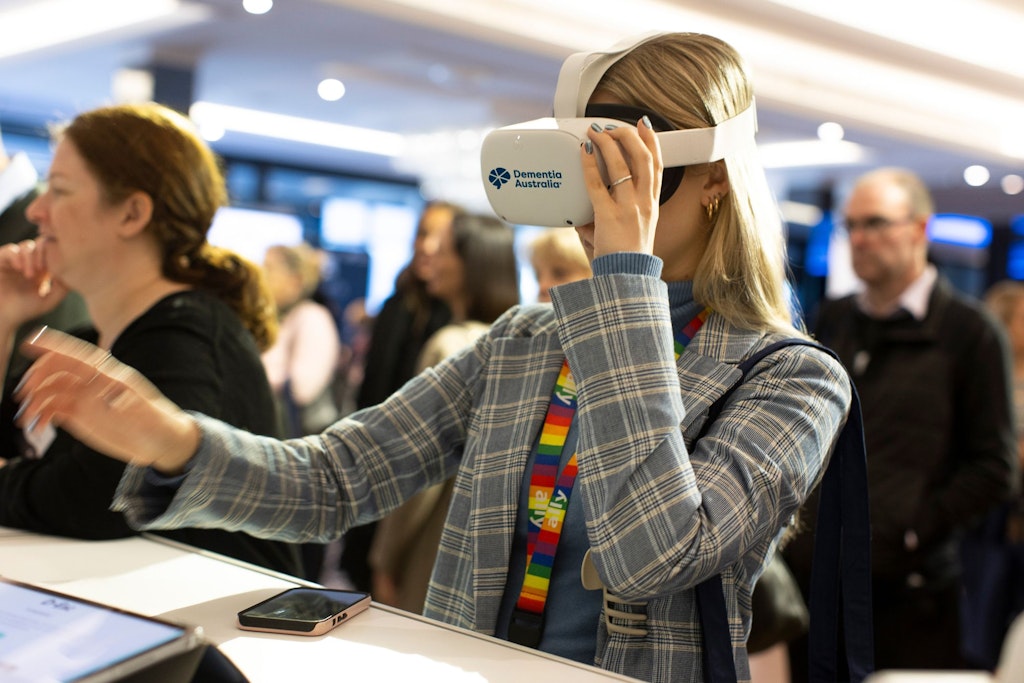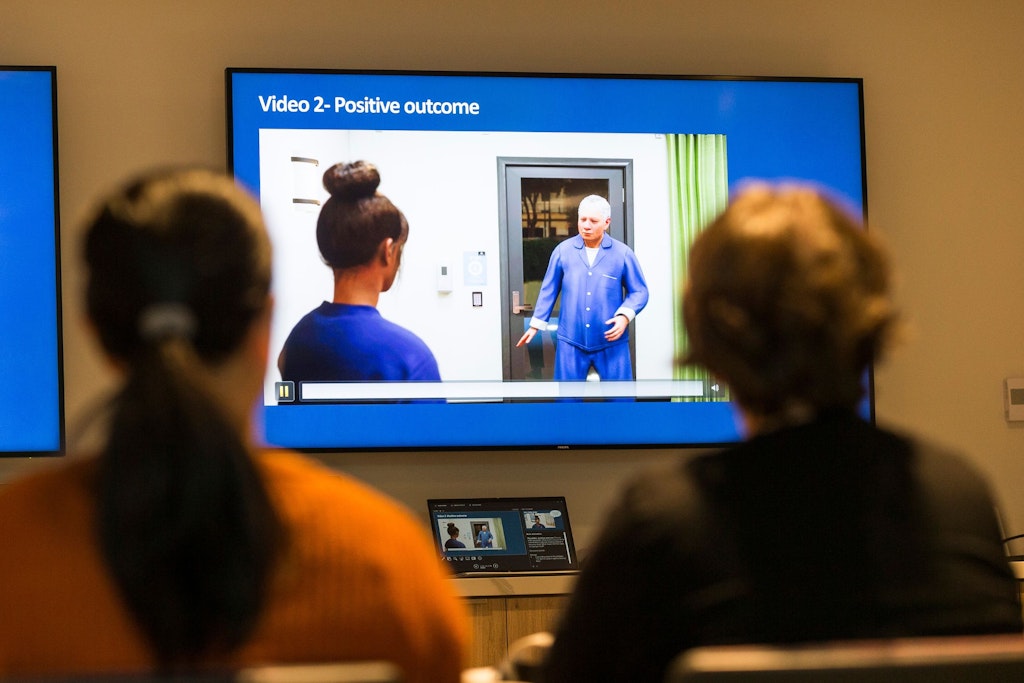Shades of grey: VR training explores the layers of dementia behaviours
Last updated on 13 June 2024

Imagine you’re in a split-second moment where a decision could have far-reaching consequences. For example, there’s a resident living with dementia exhibiting aggressive and potentially dangerous behaviours as they demand to be let out of the residential care home.
Other residents and staff could be hurt, while the resident at the centre of the emergency is arguably at the greatest risk of all. Would you be absolutely sure you know what choice to make, or do you believe even the most level-headed leaders would second guess themselves under pressure?
That’s the kind of scenario Dementia Australia exposes workers to in their latest training offering, D-Esc. Hello leaders journalist Alex Jacobs was on site at the Adelaide Convention Centre as they unveiled the new technology.
Finding a new perspective
Dementia Australia has embraced immersive learning and its virtual reality (VR) offerings are all about giving the user a new perspective. Now, this is no sales pitch – this is my experience with both Enabling EDIE and D-Esc.
Enabling EDIE, which you could arguably say is stage one of VR dementia education, puts you in the position of someone living with dementia. Even a short experience where I had to navigate from the bedroom to the bathroom at home opened my eyes to the dizzying challenges everyday life can provide.
D-Esc shifts the scene to residential aged care where a resident living with dementia exhibits a range of escalating behaviours. Your decision-making skills are repeatedly put on the spot. And there are layers to every choice you make, an important element for Dr David Sykes, Director of the Centre for Dementia Learning.
“Historically whenever we’ve done education around behaviours it’s been about applying a specific approach to get workers to think about a range of contributing factors but they’re not really dealing with an event as it happens,” Dr Sykes told hello leaders.
“This starts from the pointy end when you’re in that moment. How do you respond and then work back to avoid those situations happening?
“For the first time, it brings in technology that uses decision points. Users are confronted with something that’s not just a black-and-white situation. There are shades of grey. How do you make a call and what’s the potential consequence of that? It creates this safe space where you can try things [..] that’s gold from a learning point of view.”
Those thoughts were echoed by Dr Tanya Petrovich, Business Innovation Manager, who highlighted the complexities associated with a behavioural emergency. For example, she mentioned how different perspectives can leave family members blaming care workers over an incident, while some staff may blame the person living with dementia.
But in a situation like this, she said there is so much complexity there should be no blame, just opportunities to learn.
“With D-Esc we can talk about behavioural emergencies and what goes wrong, but it’s far more complex. You can break it down, so you can say ‘I’ll try that again in a different way and unpack that’ or ‘What happens if I do this, what if I do that’,” she explained.
“When you’re in an emergency you often reflect on it and think ‘I probably didn’t make the best decision’. But being able to go through it before it happens is a powerful tool.”
Technology that embeds understanding

Technology is transforming the way we learn. Its impact is easily going to be felt the most in areas such as this where real-world learning is not always possible.
Dr Kaele Stokes, Executive Director Services, Advocacy and Research, told hello leaders that D-Esc provides an opportunity for individuals to understand the role they play in de-escalating a situation and to practise the skills to avoid escalation.
“If you think about the complexity of care in the modern environment, people moving into residential care or are accessing community-based care often have high acute care needs. We don’t have a workforce that’s trained to address those care needs,” she said.
“Think about military personnel who have tailored training to respond to an emergency situation, we don’t have that in a care environment. Yet those same skills in terms of understanding how to make quick decisions, reading the room, and thinking about verbal and nonverbal communication, they can make a huge difference.”
One of the most important lessons here focuses on understanding the spectrum of behaviour and engagement that can make a difference to somebody living with dementia. Dr Stokes said their goal is to help aged care workers apply that understanding to everyday interactions.
“In the case of George, who is agitated because he’s late to work and wants to leave the service, realising the importance of that for him creates understanding. Often there’s tension between correcting somebody and saying ‘No, George, you don’t work anymore’ and whether that is a useful technique for de-escalating a situation,” she added.
“In their version of what they’re experiencing, they are still a member of the workforce, so having the ability to tap into their experience, but also focus on what you’re saying, the verbal and non-verbal cues that you’re giving, all those things can make a huge difference.”
After trying D-Esc, it’s easy to see why Dementia Australia is buoyed by its possibilities. Training focused on de-escalating behaviours is untapped in the sector and to have it on offer in a safe environment where trial and error can occur is exciting.
Now we just have to wait and see how this will influence dementia care when real life challenges occur.